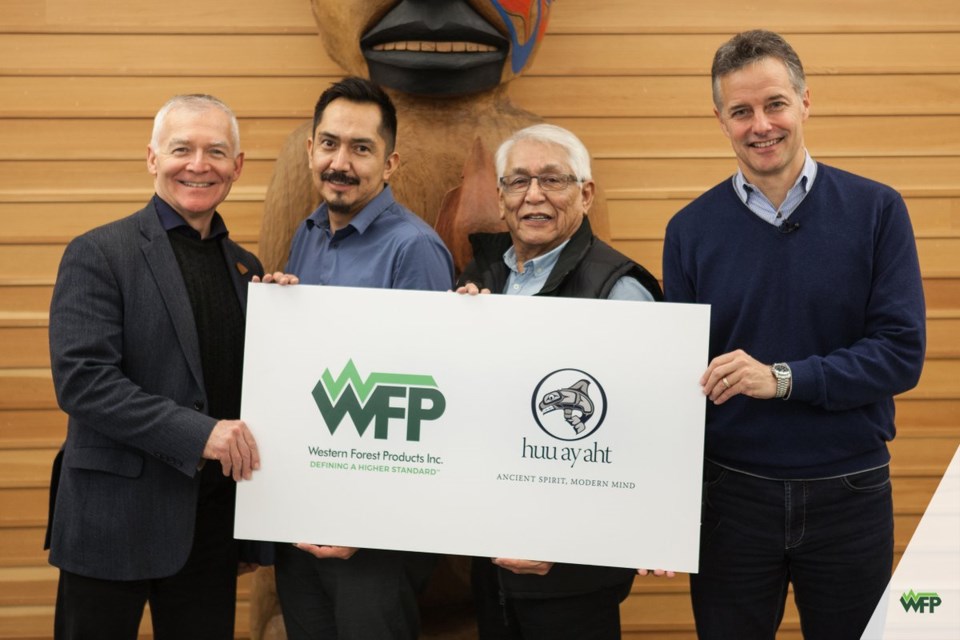In early 2018, Western Forest Products Inc. and Huu-ay-aht First Nations signed the Reconciliation Protocol Agreement to advance a shared vision of reconciliation and revitalization of the forest sector in the Alberni Valley. In August, we built upon that agreement by announcing our commitment to explore potential alternative ownership structures in Huu-ay-aht’s hahouthlee (traditional territories).
Last month, Huu-ay-aht and Western took a historic leap toward reconciliation by announcing an agreement to form a new limited partnership — in which Huu-ay-aht will purchase a seven per cent interest — to operate tree farm licence 44. For Huu-ay-aht, this is an important milestone to increase Huu-ay-aht participation in the co-management of timber-harvesting operations within the hahouthlee. For Western, a publicly traded company, the agreement marks an important advancement of reconciliation and serves as an example of how business and First Nations can work together to reconcile their interests.
For many years, Western and Huu-ay-aht have shared a unique business relationship and have collaborated on a series of forestry agreements to enhance Huu-ay-aht’s involvement in the forest sector. Recently, this has involved the purchase and long-term leaseback of land at the Sarita dryland sort, the sale of timber harvested from Huu-ay-aht treaty settlement lands, and an employment and training agreement for Huu-ay-aht citizens. These agreements are mutually beneficial to both parties and structured around Huu-ay-aht’s three sacred principles of iisaak (greater respect), uu-athluk (taking care of) and hishuk ma c’awak (everything is one and connected).
Huu-ay-aht and Western share a vision that includes a framework for reconciliation and revitalization of the Alberni Valley forest sector, and we see the new limited partnership as a significant step toward implementing a framework by:
• increasing participation in tenure ownership;
• increasing sustainable employment;
• supporting local manufacturing;
• promoting a more collaborative approach to planning and sharing of infrastructure across Huu-ay-aht territory and TFL 44; and
• building on strong environmental stewardship that aligns with Western’s practices and Huu-ay-aht’s guiding forestry values and sacred principles.
The Alberni Valley, including TFL 44, was once home to the most productive timberlands in British Columbia. Over the past two decades, however, the Alberni Valley has suffered from numerous reductions in the allowable annual cut, leading to substantial missed opportunities. As a result, the area has seen industry fragmentation, a reduced investment in manufacturing capacity, increased land-use disputes and a fractured forest land base.
By working together and finding common ground, we can solve many of these issues. We believe we can grow the Alberni Valley forest sector and provide new opportunities — including supporting entrepreneurship, higher-quality services and high-paying jobs — for those who live in the Alberni Valley.
As partners, our goal is to revitalize the forest sector through co-operative management. By bringing the fibre basket back together and working across shared infrastructure, we will increase the economic viability of the TFL and grow the pie for the entire region. Being able to better manage the forest sector will enhance long-term sustainability that will benefit not only Western and Huu-ay-aht, but also local government, unions, other First Nations and British Columbia as a whole.
Reconciliation begins with the acknowledgment that Huu-ay-aht and neighbouring First Nations used and occupied the areas now covered by Crown forest tenures for millennia before commercial logging operations began on the west coast of Vancouver Island. For Huu-ay-aht, this opportunity provides a healthy balance between economically viable and sustainable harvesting on its traditional territory — done in a way that ensures the territory is taken care of now and into the future. Both Western and Huu-ay-aht recognize that reconciliation between Indigenous and non-Indigenous peoples is the foundation for strong, healthy and sustainable communities across British Columbia and Canada.
How we work together to take care of and develop natural resources will affect current and future generations. The forest sector must be able to rely on Crown tenures to support its investments, and with this agreement, we are well positioned to keep the interests of both Western and Huu-ay-aht front of mind while we continue to grow our businesses.
We are proud to be partners and we are excited about the future of sustainable forestry for everyone in the Alberni Valley.
Robert J. Dennis Sr. is chief councillor and Tliishin (Derek Peters) is Tayii Haw’ilth (head chief) of Huu-ay-aht First Nations. Don Demens is the president and CEO of Western Forest Products Inc.



